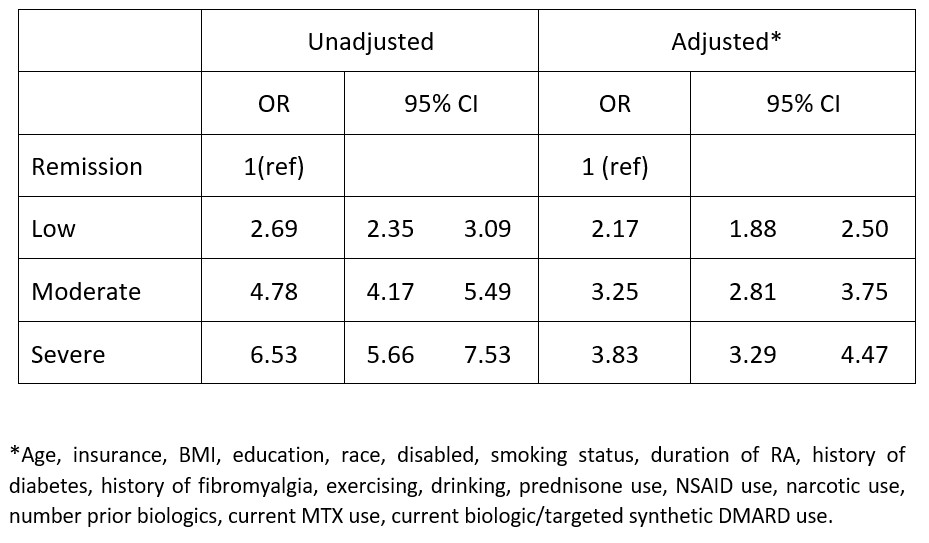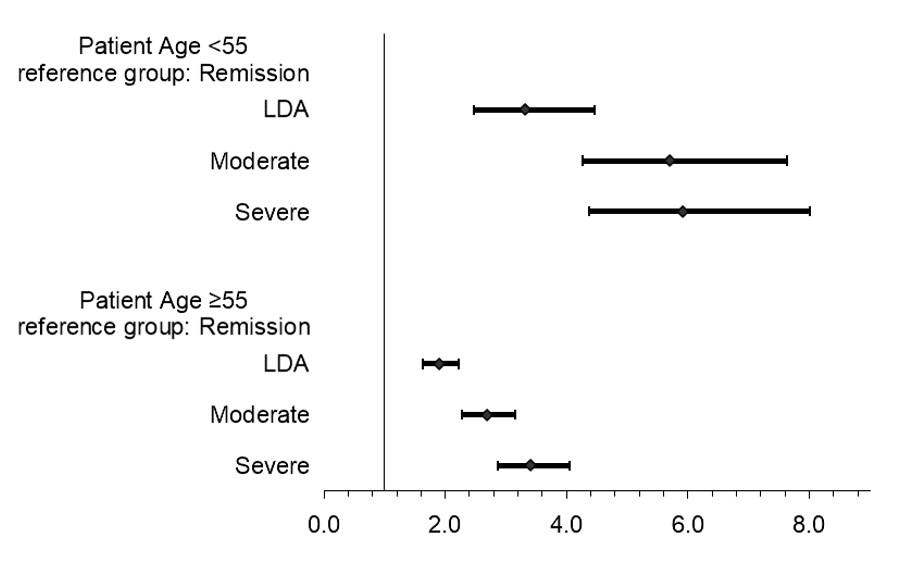Back
Poster Session C
Rheumatoid arthritis (RA)
Session: (1387–1416) RA – Diagnosis, Manifestations, and Outcomes Poster III
1397: The Impact of Disease Activity on Patient-Reported Cognitive Dysfunction in Rheumatoid Arthritis
Sunday, November 13, 2022
1:00 PM – 3:00 PM Eastern Time
Location: Virtual Poster Hall
- OP
Ozlem Pala, MD, MPH
University of Miami
Fort Lauderdale, FL, United States
Abstract Poster Presenter(s)
Ozlem Pala1, Dimitrios Pappas2, George Reed3 and Joel Kremer4, 1University of Miami, Fort Lauderdale, FL, 2Corrona Research Foundation; CorEvitas, LLC, Albany, NY, 3University of Massachusetts Medical School, Worcester, MA, 4The Corrona Research Foundation, Delray Beach, FL
Background/Purpose: Rheumatoid Arthritis (RA) is a systemic, inflammatory disease, and its burden extends beyond joint disease. RA is not commonly associated with central nervous system and brain changes. However, there is some evidence suggesting that there is a link between RA and cognitive impairment. There is limited information available in the literature regarding the prevalence, as well as the clinical and sociodemographic factors, that may contribute to cognitive dysfunction in RA. Reports of an association between disease activity in RA and cognitive dysfunction are inconsistent. This study aimed to evaluate the rate of patient-reported cognitive dysfunction and its association with disease activity using a very large, independent US registry.
Methods: We utilized data from the CorEvitas RA registry. A cross-sectional analysis used the latest patient visit available from 1/1/2011 to 12/31/2019 with information on the Clinical Disease Activity Index (CDAI), problems thinking, age and gender. The association of CDAI with patient- reported cognitive dysfunction (responded "yes" to the question asking if they had "problems with thinking") was estimated using logistic regression models controlling for sociodemographic (age, gender, race, education, insurance), comorbidity (diabetes mellitus, fibromyalgia, body mass index, smoking, alcohol use), RA disease characteristics (disease duration, disability) and medication use (prednisone, NSAID, narcotic, biologic, tsDMARD and MTX). We further examined whether the relationship between disease activity and cognitive dysfunction varied based on patients age (< 55 vs ≥ 55 years) testing the moderating effect using a likelihood ratio test.
Results: A total of 3,041 of 33,537 patients (9.1%), reported cognitive dysfunction (Table 1). Those who reported cognitive dysfunction were more likely to be women (84.1% vs. 76.5%, p< 0.001), younger (60.7 vs. 62.5 years, p< 0.001), disabled (28.7% vs. 12.0%, p< 0.001), and have a higher mean CDAI 16.2 (SD: 12.5) vs 10.1 (SD: 10.8, p< 0.001). The adjusted odds ratio (OR) for low, moderate, and severe disease activity vs remission was 2.17 [95%CI: 1.88-2.50], 3.25 [95% CI: 2.82-3.75] and 3.83 [95%CI: 3.29-4.47] respectively (Table 2). Age had a moderating effect with the association of disease activity and self-reported cognitive dysfunction more pronounced in those aged < 55. The ORs for low, moderate, and severe disease activity were 3.29, 5.59, 5.76 respectively in age < 55 vs 1.90, 2.67, 3.37 respectively in age ≥ 55 (p=0.0001) (Figure 1).
Conclusion: Increasing disease activity is associated with a higher likelihood of reporting cognitive dysfunction. The effect was more pronounced in younger as opposed to older RA patients. The predominance of reported cognitive issues in younger patients was unexpected.
 Table 1: Rates of Cognitive Dysfunction and CDAI Disease Activity Category
Table 1: Rates of Cognitive Dysfunction and CDAI Disease Activity Category
 Table 2: Association of Cognitive Dysfunction and Disease Activity (CDAI)
Table 2: Association of Cognitive Dysfunction and Disease Activity (CDAI)
 Figure 1: Moderating Effect of Age and the Odds Ratios (OR) of Cognitive Dysfunction by Disease Category in Model 2
Figure 1: Moderating Effect of Age and the Odds Ratios (OR) of Cognitive Dysfunction by Disease Category in Model 2
Disclosures: O. Pala, None; D. Pappas, CorEvitas, LLC, Corrona Research Foundation, AbbVie, Novartis, Roche Hellas, Sanofi; G. Reed, Corrona Research Foundation, CorEvitas; J. Kremer, CorEvitas.
Background/Purpose: Rheumatoid Arthritis (RA) is a systemic, inflammatory disease, and its burden extends beyond joint disease. RA is not commonly associated with central nervous system and brain changes. However, there is some evidence suggesting that there is a link between RA and cognitive impairment. There is limited information available in the literature regarding the prevalence, as well as the clinical and sociodemographic factors, that may contribute to cognitive dysfunction in RA. Reports of an association between disease activity in RA and cognitive dysfunction are inconsistent. This study aimed to evaluate the rate of patient-reported cognitive dysfunction and its association with disease activity using a very large, independent US registry.
Methods: We utilized data from the CorEvitas RA registry. A cross-sectional analysis used the latest patient visit available from 1/1/2011 to 12/31/2019 with information on the Clinical Disease Activity Index (CDAI), problems thinking, age and gender. The association of CDAI with patient- reported cognitive dysfunction (responded "yes" to the question asking if they had "problems with thinking") was estimated using logistic regression models controlling for sociodemographic (age, gender, race, education, insurance), comorbidity (diabetes mellitus, fibromyalgia, body mass index, smoking, alcohol use), RA disease characteristics (disease duration, disability) and medication use (prednisone, NSAID, narcotic, biologic, tsDMARD and MTX). We further examined whether the relationship between disease activity and cognitive dysfunction varied based on patients age (< 55 vs ≥ 55 years) testing the moderating effect using a likelihood ratio test.
Results: A total of 3,041 of 33,537 patients (9.1%), reported cognitive dysfunction (Table 1). Those who reported cognitive dysfunction were more likely to be women (84.1% vs. 76.5%, p< 0.001), younger (60.7 vs. 62.5 years, p< 0.001), disabled (28.7% vs. 12.0%, p< 0.001), and have a higher mean CDAI 16.2 (SD: 12.5) vs 10.1 (SD: 10.8, p< 0.001). The adjusted odds ratio (OR) for low, moderate, and severe disease activity vs remission was 2.17 [95%CI: 1.88-2.50], 3.25 [95% CI: 2.82-3.75] and 3.83 [95%CI: 3.29-4.47] respectively (Table 2). Age had a moderating effect with the association of disease activity and self-reported cognitive dysfunction more pronounced in those aged < 55. The ORs for low, moderate, and severe disease activity were 3.29, 5.59, 5.76 respectively in age < 55 vs 1.90, 2.67, 3.37 respectively in age ≥ 55 (p=0.0001) (Figure 1).
Conclusion: Increasing disease activity is associated with a higher likelihood of reporting cognitive dysfunction. The effect was more pronounced in younger as opposed to older RA patients. The predominance of reported cognitive issues in younger patients was unexpected.
 Table 1: Rates of Cognitive Dysfunction and CDAI Disease Activity Category
Table 1: Rates of Cognitive Dysfunction and CDAI Disease Activity Category Table 2: Association of Cognitive Dysfunction and Disease Activity (CDAI)
Table 2: Association of Cognitive Dysfunction and Disease Activity (CDAI) Figure 1: Moderating Effect of Age and the Odds Ratios (OR) of Cognitive Dysfunction by Disease Category in Model 2
Figure 1: Moderating Effect of Age and the Odds Ratios (OR) of Cognitive Dysfunction by Disease Category in Model 2Disclosures: O. Pala, None; D. Pappas, CorEvitas, LLC, Corrona Research Foundation, AbbVie, Novartis, Roche Hellas, Sanofi; G. Reed, Corrona Research Foundation, CorEvitas; J. Kremer, CorEvitas.

